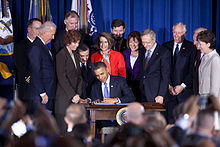- Don't Ask, Don't Tell Repeal Act of 2010
-
Don't Ask, Don't Tell Repeal Act of 2010 
Enacted by the 111th United States Congress Citations Codification - Introduced in the House of Representatives as H.R. 2965 by Patrick Murphy on December 14, 2010
- Committee consideration by: Committee on Science and Technology (Subcommittee on Technology and Innovation)
Committee on Small Business - Passed the House on December 15, 2010 (Yeas: 250; Nays: 175)
- Passed the Senate on December 18, 2010 (Yeas: 65; Nays: 31)
- Signed into law by President Obama on December 22, 2010[1][2]
Major amendments Relevant Supreme Court cases None The Don't Ask, Don't Tell Repeal Act of 2010 (H.R. 2965, S. 4023) is a landmark federal statute that establishes a legal process for ending the Don't ask, don't tell (DADT) policy (10 U.S.C. § 654), which since 1993 prevented openly gay and lesbian people from serving in the United States Armed Forces.
The Act did not immediately repeal the "Don't ask, don't tell" policy. According to the Congressional Research Service, the Act:[3]
Provides for repeal of the current Department of Defense (DOD) policy concerning homosexuality in the Armed Forces, to be effective 60 days after the Secretary of Defense has received DOD's comprehensive review on the implementation of such repeal, and the President, Secretary, and Chairman of the Joint Chiefs of Staff (JCS) certify to the congressional defense committees that they have considered the report and proposed plan of action, that DOD has prepared the necessary policies and regulations to exercise the discretion provided by such repeal, and that implementation of such policies and regulations is consistent with the standards of military readiness and effectiveness, unit cohesion, and military recruiting and retention.
The Act did not replace DADT with a ban on discrimination on the basis of sexual orientation in the military, as provided for in the proposed Military Readiness Enhancement Act.
President Barack Obama, Defense Secretary Leon Panetta, and Chairman of the Joint Chiefs of Staff Admiral Mike Mullen provided the certification required by the Act to Congress that on July 22, 2011. Implementation of repeal was completed 60 days later, so that DADT was no longer policy as of September 20, 2011.
Contents
Legislative history
Originally the Democratic leadership in both the House and Senate intended to end the "don't ask, don't tell" policy with an amendment to the Defense Authorization bill. However, the defense bill failed to clear a Republican filibuster in the Senate due to objections of the procedures from which the bill was being debated. In response, Senator Joe Lieberman introduced the stand-alone repeal bill in the Senate, and Congressman Patrick Murphy introduced the same bill in the House.
The Act was passed by the House of Representatives on December 15, 2010, with a vote of 250 to 175, and by the Senate on December 18, 2010, with a vote of 65 to 31.[4] President Barack Obama signed the bill into law on December 22, 2010.[1][2]
Senate roll call
State Senator Party Vote on
Cloture[5]Vote on
Repeal[6]Hawaii Daniel Akaka Democratic  Aye
Aye Aye
AyeTennessee Lamar Alexander Republican  No
No No
NoWyoming John Barrasso Republican  No
No No
NoMontana Max Baucus Democratic  Aye
Aye Aye
AyeIndiana Evan Bayh Democratic  Aye
Aye Aye
AyeAlaska Mark Begich Democratic  Aye
Aye Aye
AyeColorado Michael Bennet Democratic  Aye
Aye Aye
AyeUtah Robert Bennett Republican  No
No No
NoNew Mexico Jeff Bingaman Democratic  Aye
Aye Aye
AyeMissouri Kit Bond Republican  No
No No
NoCalifornia Barbara Boxer Democratic  Aye
Aye Aye
AyeOhio Sherrod Brown Democratic  Aye
Aye Aye
AyeMassachusetts Scott Brown Republican  Aye
Aye Aye
AyeKansas Sam Brownback Republican  No
No No
NoKentucky Jim Bunning Republican Did not vote Did not vote North Carolina Richard Burr Republican  No
No Aye
AyeWashington Maria Cantwell Democratic  Aye
Aye Aye
AyeMaryland Ben Cardin Democratic  Aye
Aye Aye
AyeDelaware Tom Carper Democratic  Aye
Aye Aye
AyePennsylvania Bob Casey, Jr. Democratic  Aye
Aye Aye
AyeGeorgia Saxby Chambliss Republican  No
No No
NoOklahoma Tom Coburn Republican  No
No No
NoMississippi Thad Cochran Republican  No
No No
NoMaine Susan Collins Republican  Aye
Aye Aye
AyeNorth Dakota Kent Conrad Democratic  Aye
Aye Aye
AyeDelaware Chris Coons Democratic  Aye
Aye Aye
AyeTennessee Bob Corker Republican  No
No No
NoTexas John Cornyn Republican  No
No No
NoIdaho Mike Crapo Republican  No
No No
NoSouth Carolina Jim DeMint Republican  No
No No
NoConnecticut Christopher Dodd Democratic  Aye
Aye Aye
AyeNorth Dakota Byron Dorgan Democratic  Aye
Aye Aye
AyeIllinois Dick Durbin Democratic  Aye
Aye Aye
AyeNevada John Ensign Republican  No
No Aye
AyeWyoming Mike Enzi Republican  No
No No
NoWisconsin Russ Feingold Democratic  Aye
Aye Aye
AyeCalifornia Dianne Feinstein Democratic  Aye
Aye Aye
AyeMinnesota Al Franken Democratic  Aye
Aye Aye
AyeNew York Kirsten Gillibrand Democratic  Aye
Aye Aye
AyeSouth Carolina Lindsey Graham Republican  No
No No
NoIowa Chuck Grassley Republican  No
No No
NoNew Hampshire Judd Gregg Republican Did not vote Did not vote North Carolina Kay Hagan Democratic  Aye
Aye Aye
AyeIowa Tom Harkin Democratic  Aye
Aye Aye
AyeUtah Orrin Hatch Republican Did not vote Did not vote Texas Kay Bailey Hutchison Republican  No
No No
NoOklahoma Jim Inhofe Republican  No
No No
NoHawaii Daniel Inouye Democratic  Aye
Aye Aye
AyeGeorgia Johnny Isakson Republican  No
No No
NoNebraska Mike Johanns Republican  No
No No
NoSouth Dakota Tim Johnson Democratic  Aye
Aye Aye
AyeMassachusetts John Kerry Democratic  Aye
Aye Aye
AyeIllinois Mark Kirk Republican  Aye
Aye Aye
AyeMinnesota Amy Klobuchar Democratic  Aye
Aye Aye
AyeWisconsin Herb Kohl Democratic  Aye
Aye Aye
AyeArizona Jon Kyl Republican  No
No No
NoLouisiana Mary Landrieu Democratic  Aye
Aye Aye
AyeNew Jersey Frank Lautenberg Democratic  Aye
Aye Aye
AyeVermont Patrick Leahy Democratic  Aye
Aye Aye
AyeFlorida George LeMieux Republican  No
No No
NoMichigan Carl Levin Democratic  Aye
Aye Aye
AyeConnecticut Joe Lieberman Independent  Aye
Aye Aye
AyeArkansas Blanche Lincoln Democratic  Aye
Aye Aye
AyeIndiana Richard Lugar Republican  No
No No
NoWest Virginia Joe Manchin Democratic Did not vote Did not vote Arizona John McCain Republican  No
No No
NoMissouri Claire McCaskill Democratic  Aye
Aye Aye
AyeKentucky Mitch McConnell Republican  No
No No
NoNew Jersey Bob Menendez Democratic  Aye
Aye Aye
AyeOregon Jeff Merkley Democratic  Aye
Aye Aye
AyeMaryland Barbara Mikulski Democratic  Aye
Aye Aye
AyeAlaska Lisa Murkowski Republican  Aye
Aye Aye
AyeWashington Patty Murray Democratic  Aye
Aye Aye
AyeNebraska Ben Nelson Democratic  Aye
Aye Aye
AyeFlorida Bill Nelson Democratic  Aye
Aye Aye
AyeArkansas Mark Pryor Democratic  Aye
Aye Aye
AyeRhode Island Jack Reed Democratic  Aye
Aye Aye
AyeNevada Harry Reid Democratic  Aye
Aye Aye
AyeIdaho Jim Risch Republican  No
No No
NoKansas Pat Roberts Republican  No
No No
NoWest Virginia Jay Rockefeller Democratic  Aye
Aye Aye
AyeVermont Bernie Sanders Independent  Aye
Aye Aye
AyeNew York Chuck Schumer Democratic  Aye
Aye Aye
AyeAlabama Jeff Sessions Republican  No
No No
NoNew Hampshire Jeanne Shaheen Democratic  Aye
Aye Aye
AyeAlabama Richard Shelby Republican  No
No No
NoMaine Olympia Snowe Republican  Aye
Aye Aye
AyePennsylvania Arlen Specter Democratic  Aye
Aye Aye
AyeMichigan Debbie Stabenow Democratic  Aye
Aye Aye
AyeMontana Jon Tester Democratic  Aye
Aye Aye
AyeSouth Dakota John Thune Republican  No
No No
NoColorado Mark Udall Democratic  Aye
Aye Aye
AyeNew Mexico Tom Udall Democratic  Aye
Aye Aye
AyeLouisiana David Vitter Republican  No
No No
NoOhio George Voinovich Republican  Aye
Aye Aye
AyeVirginia Mark Warner Democratic  Aye
Aye Aye
AyeVirginia Jim Webb Democratic  Aye
Aye Aye
AyeRhode Island Sheldon Whitehouse Democratic  Aye
Aye Aye
AyeMississippi Roger Wicker Republican  No
No No
NoOregon Ron Wyden Democratic  Aye
Aye Aye
AyeImplementation
Following the signing of the bill into law by U.S. President Barack Obama, the Department of Defense will commission a committee, led by Clifford Stanley, which will itself commission a comprehensive review of current policies, the repeal and whether the newer status quo will be consistent with the goals of, in the words of Robert Gates, "military readiness, military effectiveness, unit cohesion, and recruiting and retention of the Armed Forces."[7] The reception of the review by Gates, Adm. Mike Mullen and President Obama will begin the 60-day waiting period for the Department of Defense, after which the detailed reforms will be incrementally implemented through a potential variety of initiatives in a top-down direction.
It is not known if ongoing or future discharges of openly gay or bisexual service members will cease upon Obama's signature, after the 60-day period following the reception of the comprehensive review, or at some later point. The law is expected, by the Department of Defense and supportive legislators, to result in full implementation within the military structure by the end of 2011.
It is also not known exactly how Section 925 of the United States Code (also known as Article 125 of the Uniform Code of Military Justice)—the ban on sodomy among service members—will be affected by the repeal of Section 654. Because Section 925 is considered a sodomy law which is not entirely subject to the civilian-applicable Supreme Court ruling against sodomy laws in Lawrence v. Texas, 925 can still technically be applied in a prosecutorial setting against service members accused of same-sex sexual intercourse, even though the section does not explicitly mention same-sex relations in its letter. The repeal of 654, which explicitly refers to a prohibition against homosexual and bisexual service members and was reformed by the 1993 congressional law, will likely open the possibility for future military-applicable judicial proceedings on the legality of 925. Analysts, such as David Rittgers of the Cato Institute, have called for the harmonization of Section 925 in regards to any sexual behavior which is perceived as disturbing the discipline and good order of the armed forces.[8] In addition, the report by the Pentagon on the results of the survey included a recommendation for the repeal of Article 125 in order to accommodate "consensual sodomy".[9]
2011 rollout
On January 28, 2011, the Pentagon rolled out a more definitive plan for implementation of the integration of openly LGB military personnel. It calls for a three-month period of training, to begin in Q3 2011, for all personnel, describing three mandatory levels of training for troops, commanders, administrators, recruiters and others:
- The first level of training involves requiring administrators and other leaders to answer detailed questions about the new policy.
- The second level requires senior officers to enforce the policy and observe for any feelings of unease among servicemembers.
- The third level consists of the general training of all troops, which is expected to be the most difficult portion due to the wide geographic distribution of troops.
After the training period is completed, the president and his military advisors must sign to a certification which confirms the ability of the military to accept the integration of openly-LGBT personnel. Sixty days after the certification is signed, the DADT Repeal Act will take effect as law. [10]
President Obama, Defense Secretary Leon Panetta, and Joint Chiefs of Staff Chairman Adm. Mike Mullen sent Congress the required certification on July 22, 2011. Full implementation of the repeal occurred on September 20, 2011, 60 days later.
Refusal of compensation
On the same day as the roll-out of the plan for DADT repeal training, the Department of Defense issued a memo stating that it would not offer any sort of compensation, including separation pay, for those discharged under DADT. As of December 2010, those discharged under the charge of homosexuality are due half of the separation pay due to other honorably discharged servicemembers.[11] The American Civil Liberties Union said the memo was linked to Collins v. United States, a case it filed against the DoD in November 2010 seeking full compensation for those discharged under the policy.[12]
References
- ^ a b Wilgoren, Debbi; Backon, Perry Jr. (2010-12-22). "Obama to sign DADT repeal before big, emotional crowd". Washington Post. http://www.washingtonpost.com/wp-dyn/content/article/2010/12/22/AR2010122201888.html. Retrieved 2010-12-22.
- ^ a b "Obama signs bill repealing 'don't ask, don't tell' policy". Associated Press. Los Angeles Times. 2010-12-22. http://www.latimes.com/news/nationworld/nation/la-naw-dont-ask-repeal-20101222,0,4220844.story. Retrieved 2010-12-22.
- ^ "H.R.2965 - Dont Ask, Dont Tell Repeal Act of 2010". OpenCongress.org. http://www.opencongress.org/bill/111-h2965/show.
- ^ Carl Hulse (December 18, 2010). "Senate Repeals ‘Don’t Ask, Don’t Tell’". New York Times. http://www.nytimes.com/2010/12/19/us/politics/19cong.html?hp.
- ^ Roll call vote 279, via Senate.gov
- ^ Roll call vote 281, via Senate.gov
- ^ Robert Gates (December 18, 2010). "News Release". United States Department of Defense. http://www.defense.gov/releases/release.aspx?releaseid=14154.
- ^ David Rittgers (December 17, 2010). "House Bill Repeals DADT the Right Way". Cato @ Liberty, Cato Institute. http://www.cato-at-liberty.org/house-bill-repeals-dadt-the-right-way/.
- ^ Johnson, Jeh Charles; Ham, Carter F.; Biscone, Gregory A.; Oostburg Sanz, Paul L.; Ferguson III, Mark E.; Benning, Scott A.; Ginsberg, Daniel B.; Zilmer, Richard C. et al. (November 30, 2010) (PDF), Report of the Comprehensive Review of the Issues Associated with a Repeal of “Don’t Ask, Don’t Tell”, Department of Defense, p. 139, http://www.defense.gov/home/features/2010/0610_gatesdadt/DADTReport_FINAL_20101130(secure-hires).pdf, retrieved 2010-12-22, "Article 125 of the UCMJ treats all acts of sodomy, heterosexual, homosexual, consensual, or otherwise, as punishable conduct. In Lawrence v. Texas, the Supreme Court held that private consensual sodomy between adults cannot be considered a crime. The U.S. Court of Appeals for the Armed Forces reached a similar conclusion in the military context in the case United States v. Marcum. In light of these decisions, we recommend that Article 125 be repealed or amended to the extent it prohibits consensual sodomy between adults, regardless of sexual orientation. The other prohibitions considered punishable under Article 125, including forcible sodomy, sodomy with minors and sodomy that is demonstrated to be 'service discrediting' (e.g., in public or between a superior and subordinate), should remain on the books."
- ^ LOLITA C. BALDOR AND PAULINE JELINEK (Wednesday, January 26, 2011; 5:51 PM). "Pentagon to outline training for gay ban repeal". Associated Press via Washington Post. http://www.washingtonpost.com/wp-dyn/content/article/2011/01/26/AR2011012605711.html.
- ^ "Defense Department Says It Will Deny Full Separation Pay For Gay And Lesbian Service Members Honorably Discharged Under “Don’t Ask, Don’t Tell”". American Civil Liberties Union. January 29, 2011. http://www.aclu.org/lgbt-rights/defense-department-says-it-will-deny-full-separation-pay-gay-and-lesbian-service-members.
- ^ "Collins v. United States - Class Action for Military Separation Pay". American Civil Liberties Union. November 10, 2010. http://www.aclu.org/lgbt-rights/collins-v-united-states-class-action-military-separation-pay.
External links
- Bill Summary & Status - 111th Congress (2009 - 2010) - H.R.2965
- In Historic Move, Senate Votes to Repeal "Don’t Ask, Don’t Tell" - video report by Democracy Now!
- Invocation delivered at Presidential Signing Ceremony for DADT Repeal, December 22, 2010.
- Rhode Island College LibGuide - Don't Ask, Don't Tell Repeal
Part of a series on LGBT rights in the United States By entity Alabama · Alaska · Arizona · Arkansas · California · Colorado · Connecticut · Delaware · Florida · Georgia · Hawaii · Idaho · Illinois · Indiana · Iowa · Kansas · Kentucky · Louisiana · Maine · Maryland · Massachusetts · Michigan · Minnesota · Mississippi · Missouri · Montana · Nebraska · Nevada · New Hampshire · New Jersey · New Mexico · New York · North Carolina · North Dakota · Ohio · Oklahoma · Oregon · Pennsylvania · Rhode Island · South Carolina · South Dakota · Tennessee · Texas · Utah · Vermont · Virginia · Washington · West Virginia · Wisconsin · WyomingInsular area
By type Same-sex unions (Marriage · Civil union · Domestic partnership (by municipal areas)) · Sexual orientation and the United States military (Don't ask, don't tell · 2010 repeal)Nationwide
precedentsState amendments banning same-sex unions (Defense of Marriage Act) · Hate crime laws in the United States (Matthew Shepard and James Byrd, Jr. Hate Crimes Prevention Act) · Sodomy laws in the United States (Lawrence v. Texas)See also Categories:- 111th United States Congress
- Sexual orientation and the United States military
- Don't ask, don't tell
- LGBT law in the United States
- 2010 in LGBT history
- Presidency of Barack Obama
- United States federal civil rights legislation
- United States military law
- United States federal defense and national security legislation
- 2010 in military history
- 2010 in law
Wikimedia Foundation. 2010.


